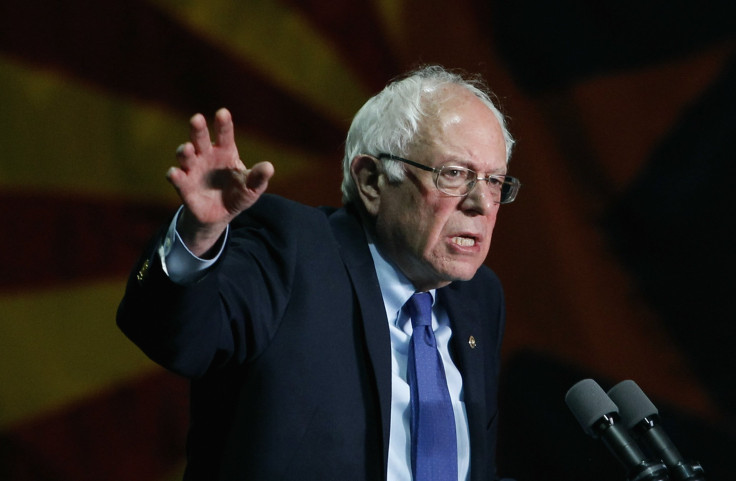Why Is Bernie Sanders Skipping AIPAC Conference? Jewish Candidate Declines Invite From Pro-Israel Group

When AIPAC, the country’s leading pro-Israel lobbying group, hosts its annual policy conference in Washington next week, most of the presidential candidates will be attending, alongside Vice President Joe Biden. But one contender will be noticeably absent: Sen. Bernie Sanders — who also happens to be the only Jewish candidate ever to win a presidential primary.
The American Israel Public Affairs Committee invites all presidential candidates to the conference in election years, and it’s a reliable campaign stop for candidates on both the left and the right looking to gain influence with the group’s powerful audience. This year, Hillary Clinton, Donald Trump and Ted Cruz have all confirmed that they will attend and speak at the event, though Trump’s plan to appear has drawn some backlash.
The Sanders campaign, however, released a letter from Sanders on Friday afternoon declining AIPAC's invitation, explaining that Sanders would be unable to attend because of his campaign schedule.
"I would very much have enjoyed speaking at the AIPAC conference," Sanders said in his letter to AIPAC president Robert Cohen. "Obviously, issues impacting Israel and the Middle East are of the utmost importance to me, to our country and to the world. Unfortunately, I am going to be traveling throughout the West, and the campaign schedule that we have prevents me from attending."
But experts say that's a convenient excuse, as Sanders’ absence from the AIPAC conference is hardly a surprise.
AIPAC has extended invitations to all presidential candidates to speak at #PC16. @HillaryClinton, @realDonaldTrump and @tedcruz confirmed.
— AIPAC (@AIPAC) March 16, 2016
“Bernie Sanders is running a domestic issues campaign. He tries to avoid talking about foreign policy at every juncture,” said Yair Rosenberg, a senior writer at Tablet, a magazine about Jewish thought and culture. “It really isn’t about him being Jewish, or his opinions on Israel. It’s just a smart campaign strategy.”
Rosenberg says that Sanders’ position on Israel during his career in Congress is not unlike that of many Democrats: he advocates a two-state solution and opposes both Israeli settlements and Palestinian violence.
“It’s a viewpoint that has been represented at AIPAC in the past, but it would be powerful coming from a Jewish candidate,” said Rosenberg. “But his voters on the left, other than a small fringe, don’t care. That’s not what they’re voting on — they care about domestic issues. There’s no reason to get sidetracked by something else.”
Sanders’ progressive base, however, has urged his campaign to skip the event to make a statement. Max Blumenthal, a senior editor at Alternet, started a petition at both Change.org and RootsAction.org calling on Sanders to reject the AIPAC invitation. The petitions have garnered about 19,000 signatures in total.
“As the main arm of the pro-Israel lobby in the United States, AIPAC has sworn to promote the racist, militaristic and anti-democratic policies of the most right-wing government in Israel's history,” the petition reads. “With his promise to seek a ‘level playing field’ on Israel-Palestine, Bernie does not belong on the same stage as these figures.”
Blumenthal said he’s not surprised Sanders is skipping the event, though, especially because Sanders is funded mainly by grassroots donors who who don’t support “the blind special relationship between the U.S. and Israel,” he said. Blumenthal added that the petition was a way to nudge Sanders into a progressive direction.
Just in: Sanders letter to AIPAC explaining he can't make it bc he's campaigning. (The other candidates are going.) pic.twitter.com/T6s4KPRO1w
— Gabriel Debenedetti (@gdebenedetti) March 18, 2016
“He’s tried to avoid the Israel-Palestine issue like the plague,” said Blumenthal. “I wanted to give people a vehicle for showing Bernie Sanders that they support him for not attending. That he has an army behind him.”
But others have suggested that Sanders attend the conference in an effort to advocate an unpopular view at AIPAC — that the group’s opposition to the Iran deal was unrealistic and that it's fair to suggest the U.S. advocate a “level playing field” in Mideast policy.
“Bernie Sanders could use this opportunity to be a truth-teller to AIPAC,” foreign policy writer Robert Naiman wrote in an open letter to Sanders. “Calling for a ‘level playing field’ in U.S. policy towards Israel and the Palestinians is a completely reasonable thing for Bernie to say.”
For now, though, Sanders is not saying much either way — though that could change on Monday. The campaign plans to send a "copy of the remarks that I would have given if I was able to attend" next week, he said.
A previous version of this story incorrectly stated Yair Rosenberg's first name as Yael. We regret the error.
© Copyright IBTimes 2024. All rights reserved.





















